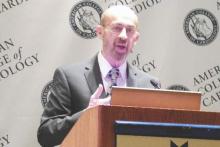CHICAGO – A class of cholesterol drugs once considered a potentially very promising approach to beneficially reset lipid levels instead produced its third flameout in a pivotal clinical endpoints trial with more than 12,000 patients.
The failure of evacetrapib treatment to produce any clinical benefit despite dramatically elevating serum levels of high-density lipoprotein cholesterol by an average 130% and substantially dropping levels of low-density lipoprotein cholesterol by a mean 37% pretty much spells the end of the cholesterol ester transfer protein (CETP) inhibitors as drug candidates, agreed many experts who heard the disappointing results. The findings also added to existing questions about the reliability of elevated HDL cholesterol levels as a marker for better clinical outcomes, and raised new concerns that a similar limitation might also apply to LDL cholesterol.
“The findings continue to challenge the hope that CETP inhibition might successfully address residual cardiovascular risk,” Dr. Stephen J. Nicholls said at the annual meeting of the American College of Cardiology.
In past reports, the only other CETP inhibitors to complete phase III trials either showed no incremental benefit like evacetrapib, which happened with dalcetrapib (N Engl J Med. 2012 Nov 29;367[22]:2089-99), or clinical harm, which occurred with torcetrapib (N Engl J Med. 2007 Nov 22;357[21]:2109-22).
“Three strikes and you’re out,” declared Dr. Steven E. Nissen, a coinvestigator on the evacetrapib trial, encapsulating his read on where the CETP class now stands.
In addition, “the failure of decreases in LDL-cholesterol to result in an overall morbidity and mortality benefit emphasizes the limitations of surrogate endpoints,” said Dr. Nicholls, the study’s lead investigator and professor of cardiology at the University of Adelaide, Australia.
“We were astonished by the LDL effects in our study. Conventional wisdom says that a 37% drop in LDL cholesterol should translate into a benefit in high-risk patients,” he noted. “This reinforces the concept that mechanism matters. Surrogate endpoints are not a replacement for clinical endpoints. We need to understand more about LDL cholesterol. We thought that [lowering LDL cholesterol] was straightforward, but it’s not.”
“The most important lesson from this study is the hazard of making [efficacy] assumptions based on surrogate endpoints,” said Dr. Frederick Masoudi, a professor of medicine at the University of Colorado in Aurora. “The way you get to a lower LDL cholesterol level is important.”
“There are two hypotheses to explain the results: Either lowering LDL cholesterol was beneficial but something else evacetrapib did caused toxicity” and counterbalanced the benefit of LDL cholesterol lowering, “or it matters how you lower LDL cholesterol,” said Dr. Nissen, chairman of the department of cardiovascular medicine at the Cleveland Clinic. “I personally think it’s the latter, that mechanism [of LDL cholesterol lowering] counts,” he said in an interview.
ACCELERATE (A Study of Evacetrapib in High-Risk Vascular Disease) enrolled 12,092 patients at more than 400 centers worldwide, about half in U.S. locations. The trial identified high-risk patients based on a history of acute coronary syndrome 30-365 days before enrollment, diabetes plus known coronary artery disease, peripheral artery disease, or cerebrovascular disease. The most common risk factor was diabetes plus coronary disease, in nearly two-thirds. The average age was 65 years, three-quarters were men, and the average body mass index was 30 kg/m2. Average LDL cholesterol at baseline was 81 mg/dL, and the average HDL cholesterol level was 45 mg/dL. About 98% of enrolled patients were on a statin at baseline, with 46% on a “high intensity” statin regimen.
The 6,038 patients randomized to receive evacetrapib took 130 mg orally daily; the remaining 6,054 were randomized to receive placebo.
The trial protocol called for treatment of up to 4 years, but the data monitoring committee stopped the study prematurely in October of 2015 after an average treatment period of 25 months because of “clinical futility” for the primary endpoint, a composite of cardiovascular death, MI, stroke, coronary revascularization, or hospitalization for unstable angina. At the time the trial halted, the primary endpoint had occurred in 13% of patients in both arms of the study. The results showed trends toward a somewhat reduced rate of all-cause death and cardiovascular death in the evacetrapib-treated patients, but the between-group differences for these two endpoints did not reach statistical significance.
The results showed two significant between-group differences for possible adverse effects from treatment that may possibly partially explain why the positive lipid changes produced by evacetrapib did not produce positive clinical outcomes: Patients on evacetrapib had a median 5% increase in their serum level of C-reactive protein, a marker of systemic inflammation, compared with a median 8% decrease in the placebo group. And on average, systolic blood pressure was 0.9 mm Hg higher in patients taking evacetrapib compared with those on placebo. Investigator reports of hypertension occurred 1.3% more often in the evacetrapib patients, a statistically significant difference. But in other respects, evacetrapib was safe, leading to no excess in overall adverse effects producing discontinuations, and resulting in significantly fewer patients with substantial elevations of creatine kinase compared with placebo. The evacetrapib patients also showed strong trends toward fewer episodes of new-onset diabetes and fewer patients with substantial increases in bilirubin, compared with placebo-treated patients.




